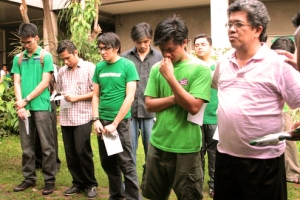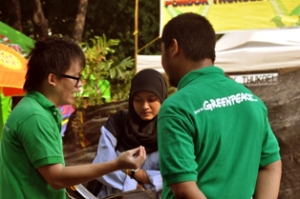Filed under: Greenpeace, Life at work, Philippines | Tags: 10/10/10, 350.org, Global Work Party, Greenpeace, Philippines

We need our politicians to Get to Work.
The past week leading up to last week was a rush. It has been quite a while since we have seen ourselves as part of something bigger, but then again it’s easy to be anaesthetized if much time is spent working within the framework of your organization only. However, the Global Work Party comes as a wake-up call, not only to world leaders but for people like me, as I’ve often worked within the confines of the office.
I remember yesterday as I was speaking at the last of the various Global Work Party activities that we went to and I was wearing a TckTckTck t-shirt and I said: “I’m wearing this t-shirt to demonstrate the irony of the climate problem as TckTckTck is an unprecedented global alliance, One of over 10,000 events in nearly every country on earth organized by TckTckTck partners and supporters in 2009 representing hundreds of millions of people from all walks of life, who are united by a desire to see a strong global deal on climate change. It was made up of leading environment, development, and faith-based NGO’s, youth groups, trade unions and individuals, and we are calling for a fair, ambitious and binding climate change agreement.
Continue reading
Filed under: Greenpeace, Life at work, Philippines | Tags: Asian Theological Seminary, Christianity, Theology
 I’m pretty sure that many are not aware that apart from doing web work at Greenpeace for the past five years, I am also a seminarian working taking up a Master’s Degree in Theology at the Asian Theological Seminary.
I’m pretty sure that many are not aware that apart from doing web work at Greenpeace for the past five years, I am also a seminarian working taking up a Master’s Degree in Theology at the Asian Theological Seminary.Chuck Baclagon
Filed under: End the nuclear age, Philippines, Stop climate change | Tags: Nukes, Energy [R]evolution, Pangasinan
![No nukes! Energey [R]evolution now!](https://greenpeacesoutheastasia.files.wordpress.com/2010/08/hand.jpg?w=420) Lately there’s a lot of clamour for energy sources that can meet our electrical needs in the face of catastrophic climate change.
Lately there’s a lot of clamour for energy sources that can meet our electrical needs in the face of catastrophic climate change.
At the same time, this has also been taken up by the nuclear lobby in order to push forward their nuclear agenda on Philippine soil.
However, we here at Greenpeace believe that quick fixes, PR and rehash of old problems fall short of taking ‘genuine’ actions. Thus in the face of climate change, we here from what is known as the most-vulnerable least-prepared countries for climate impacts would like to push forward for a revolution!
An Energy [R]evolution!
Filed under: Indonesia, Life at work, Volunteers | Tags: Acheh, Greenpeace University, Indonesia
 I am very grateful to be selected as one of the Greenpeace University (GPU) students 2010. There are only nine of us representing Indonesia and Malaysia. Of course that makes me proud. I’m proud to be here among those who came from various regions in Indonesia; Didit, Mayang, Novi, Rika, Sheila, Silka, Viktor, and Simpson from Malaysia. You are all my great friends.
I am very grateful to be selected as one of the Greenpeace University (GPU) students 2010. There are only nine of us representing Indonesia and Malaysia. Of course that makes me proud. I’m proud to be here among those who came from various regions in Indonesia; Didit, Mayang, Novi, Rika, Sheila, Silka, Viktor, and Simpson from Malaysia. You are all my great friends.
From the beginning I promised myself that I would open my mind to accept all the materials that we would be given at the Greenpeace University. Many people didn’t agree with my choice to take part in GPU. They said things like “Greenpeace is eco-fascist”, “Greenpeace is not the organization that fights for the prosperity of communities”, “You should stay at home, you will learn more here…” But may people also supported me, congratulating me on being one of the chosen few to be a GPU student. I also asked to return to Aceh and help with their advocacy work after the graduation. Their motivation made me believe I will be able to become a better campaigner in future.
Filed under: Stop climate change, Project Clean Water, Life at work, Philippines | Tags: SONA, President Noynoy Aquino, State of the Nation Address, Nereus Acosta, Bebeth Gozun, Fr. Robert Reyes
 Every year the President of the Republic of the Philippines, opens the resumption of the joint session of the Congress to report on the status of the nation in what we call the State of the Nation Address (SONA).
Every year the President of the Republic of the Philippines, opens the resumption of the joint session of the Congress to report on the status of the nation in what we call the State of the Nation Address (SONA).
Early this morning a handful of Greenpeace volunteers and concerned citizens together with Fr. Robert Reyes, Former Representative Nereus Acosta and Former Department of Environment and Natural Resources Secretary, Bebeth Gozun braved Commonwealth Avenue, in Quezon City all the way to Batasan Pambansa, starting their march from Quezon City Hall, where Fr. Reyes was able to speak about the ‘real state of the nation’ in as far as the water crisis that Metro Manila and nearby provinces in Luzon are experiencing as the Angat Watershed’s dam reached a historical low of 157.55 masl last July 16 despite the rains, triggering interrupted water supply in Metro Manila. Prompting water utility companies to implement a water rationing scheme to address the dwindling volume of water in the reservoir.
Filed under: Greenpeace, Philippines, Project Clean Water, Stop climate change, Volunteers | Tags: climate, Water, GEI, angat dam, water crisis, angat
From Solar Generation – Pilipinas
Where does water come from? A question that has been asked of me unexpectedly in one of the meetings I’ve attended for a cause. I was taken aback for it was actually the first time that I heard someone asked that kind of question. I then began formulated uncertain answers such as “from the faucet?” or “from the purified water station near our apartment?” or rather “from the sea?” Could be, right? And from that moment on, I keep on asking myself, “where does water really come from?” This is the question that all of us ought to know the answer.
Filed under: Greenpeace, Volunteers | Tags: Activism, John Key Lucy Lawless, Mining, New Zealand, protest march

Biggest protest march in living memory - March Against Mining
We expected 20,000. We HOPED for 30,000. We got nearly double that. In the biggest protest march in living memory in New Zealand, 50,000 turned out in Auckland to march against Government plans to mine coal and other minerals in national reserves.
When the New Zealand Government announced its intention to open coal mines in the country’s prime conservation land, including some of its matchless National Parks, Greenpeace New Zealand set about mobilizing supporters, celebrities, and opposing politicians to say “no.”
Lucy Lawless, best known for her role as Xena the Warrior Princess, teamed up with Robyn Malcolm, a popular television and theatre actress, to call the decision “19th century thinking in a carbon-constrained world” and created a video of tourist reactions to the proposal in one of New Zealand’s parks.
Filed under: Greenpeace, Stop climate change, Project Clean Water, Life at work, Philippines | Tags: Greenpeace, Philippines, Climate Change, Global Warming, Water, tubig, water crisis, water scarcity, saan galing ang tubig mo, san galing tubig mo, tagtuyot, summer, el nino
As I walked in the 5 hectares of land in Brgy. Mangumbali, Candaba Pampanga, I can feel the land crumbling under my feet. The land is so dried that Mr. Numeriano Alabado was not able to harvest any rice crop that he planted in his area. His fields are now full of bigcracks that if you’re not cautious, the soil might collapse.
Their water source is from UPRIS-Upper Pampanga River Irrigation System.Pantabangan Dam is the main source of their irrigation system, because the dam has stopped supplying water due to drought; their rice lands have been destroyed. Almost all the farmers in this town have lost their income due to extreme drought. All of them we’re saying that this was the first time that they’ve experienced this kind of phenomenon.
The local government provided them aid by giving them STW or Shallow Tube Well but its already late to be use for this season because of lack of water. For them, only rain could restore their devastated lands.
A.C. Dimatatac
Filed under: Greenpeace, Philippines, Project Clean Water, Stop climate change | Tags: Philippines, Climate Change, Global Warming, Water, tubig, water crisis, water scarcity, san galing tubig mo, tagtuyot, summer, el nino
We’re on our last day of our travel in the drought affected lands of Central and North Luzon. We went to Brgy. San Isidro in Naguilan, La Union wherein we met some farmers who are members of Pakisama, an organization which is into sustainable agriculture and supports capacity building of farmers in the North.
Mr. Ronaldo B. Calica, a farmer whose crop s are mainly corn, said that this is the worst drought ever. The sources of water in their area are the small creeks nearby and they are mostly dependent to rain. According to him, the last rainfall they had was when typhoon Pepeng hit the country last October 2009. After that, they didn’t experience any rainfall at all. He normally earns around 10 to 15 thousand pesos from his 1 hectare of corn but now it’s zero balance. He spent too much for the gasoline of his water pump and fertilizers but it was all for nothing because his land got dried up due to insufficient supply of water. He showed us his corn crops that are so small he can no longer use it. Continue reading
s are mainly corn, said that this is the worst drought ever. The sources of water in their area are the small creeks nearby and they are mostly dependent to rain. According to him, the last rainfall they had was when typhoon Pepeng hit the country last October 2009. After that, they didn’t experience any rainfall at all. He normally earns around 10 to 15 thousand pesos from his 1 hectare of corn but now it’s zero balance. He spent too much for the gasoline of his water pump and fertilizers but it was all for nothing because his land got dried up due to insufficient supply of water. He showed us his corn crops that are so small he can no longer use it. Continue reading
Filed under: Greenpeace, Stop climate change, End the nuclear age | Tags: Nukes, Chernobyl, chernoy
From the Nuclear Reaction blog
Twenty four years ago today, the Number 4 reactor exploded at Chernobyl. It was the worst nuclear accident the world has ever seen.

Two people were killed in the explosion. Thirty-seven died of acute radiation sickness soon afterwards. According to engineers who were there, dozens were killed while building the reactor’s concrete sarcophagus. More than 2,000 villages around Chernobyl were contaminated by radioactivity. More than 330,000 people were evacuated and relocated. Statistics predict approximately 270,000 cancers and 93,000 fatal cancer cases will be caused by Chernobyl. At least three million children required medical treatment. The effect on the health of the survivors and their children has been devastating: accelerated ageing, cardiovascular and blood illnesses, psychological illnesses, chromosomal aberrations and an increase in foetal deformations.





